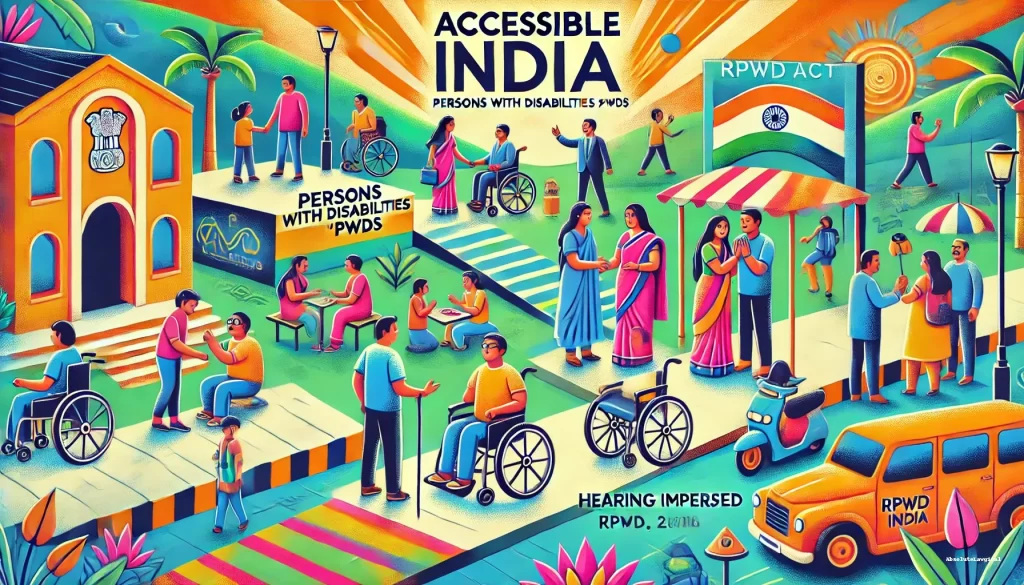
Rights for persons with disabilities in India have seen vast progress in the last two decades. While they were largely invisible in public and legal discourse, they have now been mainstreamed as matters of specialized laws and policies. These developments reflect India’s growing commitment towards ensuring equality, dignity, and accessibility for persons with disabilities. However, the chasm persists between law and its realization. This article throws an in-depth view of the status of disability rights in India in terms of the legal framework, landmark judicial interventions, commitments under international norms, challenges, and future directions.
Historical Context of Disability Rights in India
The concept of disability in India is historically understood from socio-cultural beliefs that condensed the view of disabled people. Disability before independence has been something whereby charity and pity were simply the focus rather than empowerment and rights of people with disability. After India’s independence, India is known to have realized the necessity of incorporating legal framework for the protection and promotion of rights of people with disabilities.
Basic needs-oriented schemes form the early fledgling efforts at codifying disability rights. Slowly, with familiarity and voice, India began to take a rights-based approach to disability. The enactment of the Persons with Disabilities (Equal Opportunities, Protection of Rights and Full Participation) Act in 1995 marks an important milepost in this respect laying initial groundwork for further legislation and policies.
Legal Framework of Disability Rights in India
India has, over the years developed a significant legal framework for PwDs, of which the
present laws borrow global best practices and comply with international standards on human
rights. Its core instruments are:
1. The Rights of Persons with Disabilities Act, 2016 (RPWD Act). It is the most inclusive disability legislation in India. The RPWD Act achieves conformity with the UN Convention on the Rights of Persons with Disabilities (UNCRPD), ratified by India in 2007. The RPWD Act replaced the 1995 Act and marks a transition from a welfare approach to a rights-oriented framework.
Some major features of the RPWD Act include:
Expansion of Definition of Disability: This act has expanded the disabilities list from 7 to 21 that include persons having acid attack survivors, dwarfism, muscular dystrophy, multiple sclerosis, and many more.
Reservation in Education and Employment: It actually reserves 5% places for PwDs in higher education institutions and provides 4% reservations in government jobs. Private sector corporate houses too have been motivated toward adopting normative and inclusive hiring practices.
Accessibility: Infrastructure, Transport systems and Services should be accessible to persons with disabilities. It also mandates the conducting of accessibility audits in public spaces and ensure that information is accessible with formats such as Braille, sign language, and captioning.
Non-Discrimination: Discrimination in employment, education and healthcare, services, and access should be prohibited towards people with disabilities. The law also prohibits inhuman treatment, abuse, and exploitation.
Capacity and Support : The Act protects PwDs from being deprived of their capacity to make decisions, yet support can be extended for such decisions where appropriate. There is limited guardianship for persons under directions for support over their affairs.
Social Security and Rehabilitation: The Act obliges the government to formulate plans for providing PwDs security through finances, medical facilities, and rehabilitation.
2. The Mental Healthcare Act, 2017
Mental Healthcare Act, 2017 It is one transforming legislation to ensure the rights of persons suffering from mental health conditions are addressed. It focuses on ensuring access to mental health services to protect patient autonomy and eliminate stigma around mental illness.
Mental Healthcare Act Key provisions:
Right to Access Mental Health Care: It enumerates that every individual has the access of the facility of an affordable mental health care with a preference for community-based or de-institutionalized care
Decriminalization of Suicide: This Act is also strongly silent on the issue of decriminalization of suicide as it believes that such an act should be dealt with mercy rather than punishment.
Advance Directives: Patients have the right to decide in advance and make decisions about their treatment and designate other representatives to make decisions on behalf of the patient, which maintains autonomy and dignity.
Non-Discrimination in Healthcare and Insurance: Mental health disorders cannot be discriminated against for insurance coverage and are treated equally with physical health disorders.
3. The National Trust Act, 1999
The National Trust for the Welfare of Persons with Autism, Cerebral Palsy, Mental Retardation, and Multiple Disabilities Act, 1999 gives wide care and protection to people who are grossly disabled. This Act creates a trust to support individuals with such disability so that they might lead their lives independently and become integral parts of society as well.
Judicial Decisions on Disability Rights
Perhaps no institution has been a sterner champion of progressive judgments upholding and expanding disability rights than the Indian judiciary. Although, through its rulings on disability laws, the courts have interpreted these in ways that strengthen the principles of equality, dignity, and non-discrimination enshrined in the Indian Constitution, the core aspiration of disability legislation has been to empower persons with disabilities.
Vikash Kumar v. Union Public Service Commission (2021): In this judgment, the Supreme Court recognized the legal right of PwDs to reasonable accommodations in competitive exams. The court stressed that the policies of examination authorities ought to be positive and not adverse in the discharge of such duty so as not to disfavor PwDs.
Jeeja Ghosh v. Union of India (2016): The Supreme Court compensated a woman suffering from cerebral palsy who was inappropriately deboarded from an airplane. The judgment reflected the need to treat PwDs with respect and dignity at all levels, including traveling.
Justice Sunanda Bhandare Foundation v. Union of India (2017): The Delhi High Court directed all government buildings to be made accessible for PwDs, and they also declared that the accessibility and inclusion of public infrastructure are essential. International Commitments and India’s Obligations
India ratified the UN Convention on the Rights of Persons with Disabilities in 2007, marking a watershed moment for its disability rights framework. UNCRPD emphasizes a comprehensive, rights-based approach towards disability through full participation in society, accessibility, and non-discrimination.
As a signatory country, India is obligated to submit periodic reports about progress made in accordance with the principles of the convention to the UN Committee on the Rights of Persons with Disabilities. Domestic laws in India, including the RPWD Act, reflect many of the provisions of the UNCRPD, especially in areas like accessibility, independent living, and the rights to education and employment.
Challenges in Implementing Disability Rights
Although the legal framework is progressive and the judiciary has been most proactive, practical implementation of disability rights in India suffers from a number of challenges:
- Awareness and Attitudinal Barriers:
There exists a vast section of people including policy makers and employers and service
providers who are ignorant about the rights of PwDs. Most of it is translated into social
stigma and stereotypes and discrimination towards them in society. Moreover, many PwDs are also ignorant of rights bestowed upon them in law, which itself creates more problems in Issues related to Accessibility
However, the RPWD Act does not result in high compliance, especially in rural areas and small towns. Most public buildings, transportation systems, and digital services are not accessible to PwDs. The infrastructure makes it difficult for PwDs to participate in any or all of society, such as education, employment, healthcare, or public spaces. - Education and Employment Barriers
Even though there is a quota for PwDs, the unemployment levels are stil remarkably high. Most educational institutions and workplaces cannot be accessed entirely due to a deficiency of facilities that can help PwDs easily get around. There are very few vocational training programs specifically designed with PwDs’ needs in mind. - Access to Health Care
The core problem is that healthcare access for PwDs is a concern-often specific to rural and
disadvantaged regions. Mental health care may have been envisioned by the Mental Healthcare Act, but such services are poorly delivered due to the scarcity of trained personnel and resources. Moreover, private healthcare services are too expensive and often inaccessible for PwDs from the underprivileged strata. - Lack of Legal and Policy Provisions
While progressive laws are in place, there is still a gap in effective enforcement. For example,
the RPWD Act sees appointment of Disability Rights Commissioners in all the states, who
should be monitoring the legal provisions. However, most states have failed to appoint them
or have neither the resources nor the authority to operationalize these provisions.
Improving Disability Rights in India: The Future
To actualize the rights of PwDs, the following must be put in place:
Awareness and Sensitization Campaigns: Sensitization through national campaigns about disability rights should be accompanied by reduction of stigma. Service providers, trainers, and employees need to be included in sensitization as a means toward embracing inclusion and accessibility.
Strengthen the normative domain: Enhanced legal implementation of laws such as RPWD Act and Mental Healthcare Act through intent efforts in enforcing these laws uniformly across the country, calls for the appointment of Disability Rights Commissioners in all states and adequate resources to support them.
Infrastructure and Technological Accessibility The public and private sectors also require investments in accessible infrastructure and services. There is wide promotion of affordable technological solutions, including assistive devices, accessible websites, and apps.
Inclusive Education and Employment Policies: Higher education institutions should ensure resources to enable PwDs. For this, scholarships, accommodation, and inclusive curricula should be available. Likewise, at the workplaces, an era of inclusive hiring should begin where necessary accommodations should be provided for PwDs.
Healthcare Access: Efforts should be made that healthcare services, particularly mental health services, are accessible and affordable to PwDs. At the same time, professionals in health services should be trained to meet the specific needs of PwDs.
Conclusion
India has made notable steps toward building a legal framework for safeguarding and advancing disability rights. At the same time, much more needs to be done to achieve full inclusion and equity for people with disabilities. Laws such as RPWD along with others like the Mental Health Care Act are a pathway forward, but poor and limited implementation of these issues often hangs them in question. It would not be easy to ensure these for any government, civil society, or private sector while dealing with these challenges, especially ensuring that the PwDs are not only protected in law but can live empowered, fulfilling, dignified, and independent lives. The rights of persons with disabilities in India are basically a matter of human rights, hence, the need for collective attention and action.
Ashya
MNLU, Mumbai
